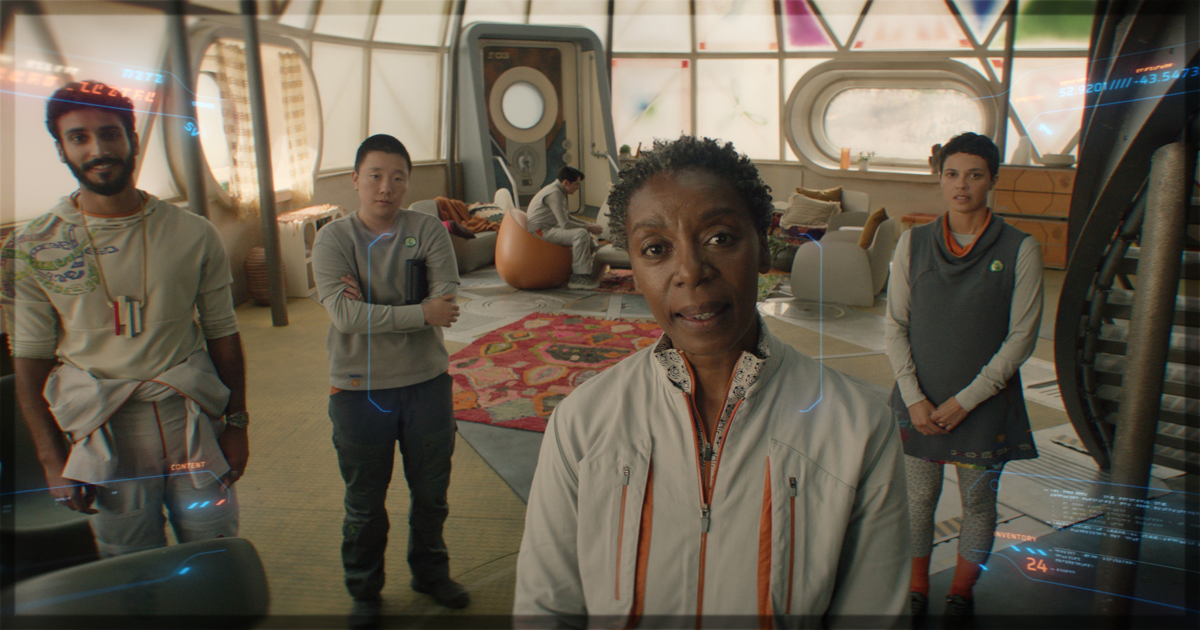The eponymous hero of this new TV show Murderbot, based on the first of The Murderbot Diaries series of novels by Martha Wells, is strictly speaking a cyborg. It – though sometimes its clients misgender it as a he – has a metallic structure covered with cloned human flesh, including a face, but neither internal nor external organs. It does have a brain (from what it is formed is not discussed) and it does have a personality. A sarcastic, avoidant, anxious personality. Rather than provide security, for it is a SecUnit, it would rather watch its television shows, which are largely space operas or medical soaps (and more on this later). It hates eye contact, human fluids, and human emotions. It knows what sex is but thinks it’s horrible. If it was a person it could be a boy in his very early teens. It could be neuroatypical. But because it is not human both of those comparisons are offensive. This is somewhat the point.
The fact that space exploration is not possible with ordinary humans has given artists over the last century a huge new metaphor to play with: that of the non-sentient creature on whom the space explorers rely trying, with varying levels of success, to understand and/or join unpredictable humanity. The various Star Trek TV shows started small, with a pointy-eared man from an alien race needing to have the purpose of feelings explained to him. Over the decades their AI became a humanoid robot, a goo alien undercover in human form, and a woman who was enslaved as a child and bonded with a robot fighting corps against her will. In the Star Wars juggernaut there were adorable robots meant as toys for the kids as well as translator robots able to skip the plot along without any unfortunate misunderstandings like ordering condoms on toast instead of jam whilst in France. There was the further realisation, such as in Blade Runner, that the first thing a lot of people would do to robots is have sex with them (if such a thing isn’t a more complex form of self-pleasure, that is). And at the same time there was art full of the realisation that robots are better than human soldiers, in that they cannot override their programming, whether that is to kill or not to kill.
The trouble is that many people have reached the wrong conclusion from this metaphor. Instead of seeing these machines as metaphors for the best and the worst of humanity learning how to cope under impossible pressure, they have become a way of anthropomorphising machines. We humans tend to do this, as anyone who has named a car or dubbed its failure to start a personal insult can attest. But in the current moment we seem to be embracing the idea that the machines are a deeper form of humanity, one with the weaknesses removed. This is wrong, of course. Machines can only reflect their structure and/or their programming and any seemingly intuitive leaps are like the comments a trained parrot can make. There might be something there, but human is the last thing that it is. And while we might wish that we humans could quote-unquote improve ourselves, the simple fact of the matter is that we cannot. The whole irritating, seething mass of us are going to crack jokes under stress or fall in love with the wrong person or be rude in the line for the movies or throw up on Mom’s clean floor and there’s not really anything we can do about it, except try to be better.
But the reason for all these high-tech depictions of making mistakes, maturing as an individual and learning to stand up under the weight of our own choices is – and things are about to get controversial up in here – because of misogyny. It is terrible that modern culture and the so-called manfluencer sphere has defined masculinity as an absence of so-called irrational feeling. That means any feelings which do not centre the man’s wants and desires, or which might require him to accept he has at times not behaved perfectly, are irrational and therefore not supposed to exist. You bet that’s a generalisation, but there are only so many times a person can see teenage boys on public transport sharing nudes before that person comes to understand there’s a huge issue with dehumanisation in our current society. Men dehumanising women, governments dehumanising immigrants, white people dehumanising everybody else, and the able-bodied dehumanising people of any age or ability who need a little help.
And that’s without getting into how language learning models are scraping and stealing every human thought, copyright be damned, typed into the internet to twist for their own insensate purposes. An enormous amount of powerful people are packaging those so-called thoughts as chocolate instead of doggy-do. The LLMs and AI in the current marketing sense are designed to tell us what thinks we want to hear, and a whole ton of people think this is a major leap forward instead of a cage full of endlessly squawking parrots using a bottle of water every time.
So here we are, with a major new television series on Apple TV+ about a cyborg who calls itself Murderbot (Alexander Skarsgård) who comes to realise that, by giving itself free will, it needs to figure out what being human is all about, whether it wants to or not. (And let’s face it, we all picked an equally stupid handle for our first email address or social media profile.) As the show begins it hacks its “governor module” – the goober which prevents it from causing harm and compels it to obey the people it is working for – meaning it is no longer under corporation control, then immediately realises it had better not tell anybody about that. Murderbot is something between a thing and a person, but it suits its owners – a megacorporation called Corporation Rim a lot like the one in the Alien movies – to treat it as inventory, something that can be bought and sold, or melted down into an acid bath if necessary.
Murderbot is picked for a new assignment as it’s the cheapest option available for a small exploratory group of six “hippie scientists” from an independent planet called Preservation Alliance. They are not under corporation control but working with them on a mining research mission on a remote and otherwise nearly empty planet. Taking Murderbot on “this thrilling expedition” is the only way they’ll be insured by the corporation. This is extremely irritating to Murderbot, who thinks most of the people it meets are jerks and anything that keeps it from its shows is bullpuckey. This is not the language used, of course, and while the Anglo-Saxon terms are fine for adults, it’s not the kind of thing a lot of adults want their kids to be hearing. On the other hand, refusing to censor this means this automatically becomes the kind of show cool older siblings can let their irritating little brothers watch with them. The nudity is also daringly appropriate for kids, too.
Murderbot narrates the story through Skarsgård’s excellent voiceover as the worldbuilding makes clear who we’re dealing with and what the stakes are. The hippies make decisions by consensus and prioritise lives over expensive equipment, both things new to Murderbot. It does try to do good work for them, and its choices in this episode, which it thinks were quite stupid, will very clearly drive forward the rest of the plot. The fact that this weird cyborg would rather be watching television – with a favourite TV show not at all like Star Trek called “The Rise and Fall of Sanctuary Moon” played by actors whose mere appearance in this made me laugh out loud – means that it is a very relatable leading character. There’s a few little out-of-context recurring memories that are a cause of concern, which is very universal. And would it rather speak in public, or be dipped in acid? It is a tough choice!
Co-creators Paul Weitz and Chris Weitz, who jointly wrote the script though only Paul directed, have a solid track record of work centering the emotional awkwardness of young men. It’s fair to say that despite any concerns with the subject matter, they have struck gold with the material, their approach, and Skarsgård’s winningly weird performance. As it unfolds we’ll be able to assess whether this cyborg can reach some kind of maturity either on its own terms or human ones. Or maybe it will just do what SecUnits normally do in soap operas: go rogue and kill everyone they were supposed to protect. It is, after all, a tough choice.
One final thing: the credits sequence is a thing of beauty.
Murderbot is now streaming on Apple TV+. New episodes air on Fridays.
Learn more about the show, including how to watch, at the Apple TV+ site for the title.


